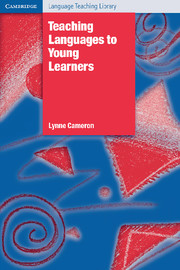Book contents
- Frontmatter
- Contents
- Preface
- Acknowledgements
- 1 Children learning a foreign language
- 2 Learning language through tasks and activities
- 3 Learning the spoken language
- 4 Learning words
- 5 Learning grammar
- 6 Learning literacy skills
- 7 Learning through stories
- 8 Theme-based teaching and learning
- 9 Language choice and language learning
- 10 Assessment and language learning
- 11 Issues around teaching children a foreign language
- References
- Index
10 - Assessment and language learning
Published online by Cambridge University Press: 05 May 2010
- Frontmatter
- Contents
- Preface
- Acknowledgements
- 1 Children learning a foreign language
- 2 Learning language through tasks and activities
- 3 Learning the spoken language
- 4 Learning words
- 5 Learning grammar
- 6 Learning literacy skills
- 7 Learning through stories
- 8 Theme-based teaching and learning
- 9 Language choice and language learning
- 10 Assessment and language learning
- 11 Issues around teaching children a foreign language
- References
- Index
Summary
Issues in assessing children's language learning
Introduction
The nature of children's foreign language learning might be expected to generate a range of assessment issues in need of attention. Factors such as the following might make the business of assessing young learners different from assessment practices in other FL situations:
Age: children's motor, linguistic, social and conceptual development must be taken into account in designing and implementing assessment.
Content of language learning: a focus on oral skills, vocabulary development and language use at discourse level.
Methods of teaching: interactive use of games, songs, rhymes, stories to carry language content and practice.
Aims: programmes for young learners often cite social and cross-cultural aims, as well as language learning aims.
Learning theories: e.g. zone of proximal development; learning through social interaction, able to do more with helpful other.
A survey of the sparse information that is available on young learner assessment (but see Rea-Dickins 2000) suggests that assessment practices, far from taking careful account of the above factors, may find themselves in conflict with them. In this first section, macro-level and then more micro-level conflicts are identified. Section 10.2 sets out principles for assessment that emerge from our learning-centred perspective. Key concepts in assessment are explained in section 10.3. In section 10.4, we consider techniques other than testing that teachers can use to assess children's language learning. Section 10.5 discusses self-assessment in the young learner classroom. Section 10.6 considers how the outcomes of assessment can be used to support learning through feedback to children.
Information
- Type
- Chapter
- Information
- Teaching Languages to Young Learners , pp. 214 - 240Publisher: Cambridge University PressPrint publication year: 2001
